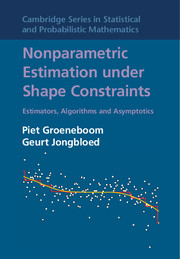Book contents
- Frontmatter
- Contents
- Preface and Acknowledgments
- 1 Introduction
- 2 Basic Estimation Problems with Monotonicity Constraints
- 3 Asymptotic Theory for the Basic Monotone Problems
- 4 Other Univariate Problems Involving Monotonicity Constraints
- 5 Higher Dimensional Problems
- 6 Lower Bounds on Estimation Rates
- 7 Algorithms and Computation
- 8 Shape and Smoothness
- 9 Testing and Confidence Intervals
- 10 Asymptotic Theory of Smooth Functionals
- 11 Pointwise Asymptotic Distribution Theory for Univariate Problems
- 12 Pointwise Asymptotic Distribution Theory for Multivariate Problems
- 13 Asymptotic Distribution of Global Deviations
- References
- Author Index
- Subject Index
4 - Other Univariate Problems Involving Monotonicity Constraints
Published online by Cambridge University Press: 18 December 2014
- Frontmatter
- Contents
- Preface and Acknowledgments
- 1 Introduction
- 2 Basic Estimation Problems with Monotonicity Constraints
- 3 Asymptotic Theory for the Basic Monotone Problems
- 4 Other Univariate Problems Involving Monotonicity Constraints
- 5 Higher Dimensional Problems
- 6 Lower Bounds on Estimation Rates
- 7 Algorithms and Computation
- 8 Shape and Smoothness
- 9 Testing and Confidence Intervals
- 10 Asymptotic Theory of Smooth Functionals
- 11 Pointwise Asymptotic Distribution Theory for Univariate Problems
- 12 Pointwise Asymptotic Distribution Theory for Multivariate Problems
- 13 Asymptotic Distribution of Global Deviations
- References
- Author Index
- Subject Index
Summary
In Chapter 2, various models were introduced where monotonicity constraints are clearly involved. In this chapter, more problems will be described where monotonicity constraints play an important role. These constraints can be related to the interpretation of these problems as inverse problems, as also seen in Section 1.5. Some distribution function F (by definition monotone) in the background is to be estimated based on data from an induced distribution function G. Monotonicity of F induces more or less explicit shape constraints on the sampling distribution function G.
First a classical problem from stereology is considered: Wicksell's problem. This is concerned with estimating the distribution of radii of spheres randomly scattered in an opaque medium based on radii of circular profiles obtained by intersecting the medium with a plane. The second problem is that of estimating a concave regression function based on noisy data. Related to this, a simple model from ornithology is introduced. It concerns estimating the distribution of sojourn times of birds at an oasis based on observed times when specific birds were caught at the oasis. As in Wicksell's problem, imposing certain assumptions, the sampling distribution can be expressed in terms of the underlying distribution of interest. Also the estimation of log concave densities, star shaped distribution functions and distribution functions in deconvolution models more general than that of Section 2.4 and in the interval censoring case 2 will be considered.
For the problems discussed in this chapter, estimation procedures will be introduced, characterizations of these estimators will be given and some estimators will also be studied asymptotically. Estimation paradigms as plug-in inverse estimators, least squares estimators and maximum likelihood estimators will be illustrated and studied.
Wicksell's Corpuscle Problem
In the early 1920s, the Swedish mathematician Sven D. Wicksell at the University of Lund was confronted with an interesting problem from the medical sciences. Anatomist T. Helman tried to get hold of the distribution of the size of so-called follicles in human spleens. Postmortem examinations were executed, during which spleens were sliced at several places.
- Type
- Chapter
- Information
- Nonparametric Estimation under Shape ConstraintsEstimators, Algorithms and Asymptotics, pp. 87 - 120Publisher: Cambridge University PressPrint publication year: 2014

